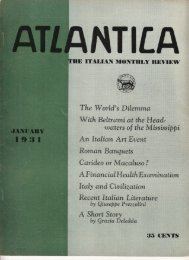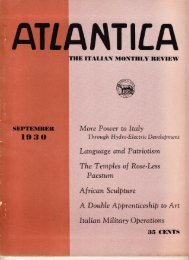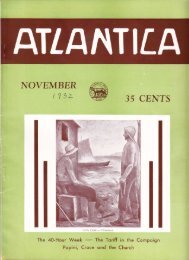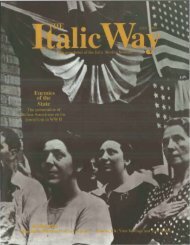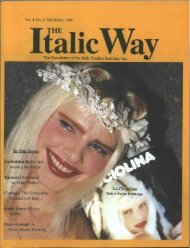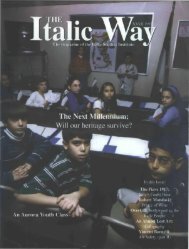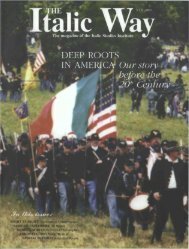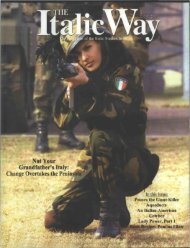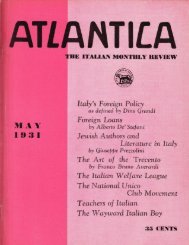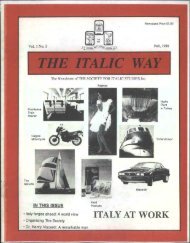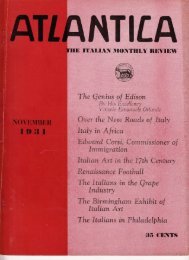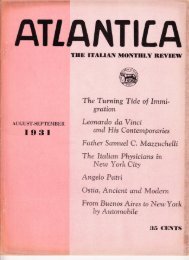lrr258ATLANTICA, JUNE, 1931femain dormant much longer? live, see no mol'e than the ris- pels the heart to love the goodlMe should not rest satisfied ing ;;; of their birthd'ay ! and beautifui, to applaud thewith either proojiy ;;;;;s' t{.it epitaplt, too, might be.: triumphs of virtue amid tneDante or merely admitting we "Et roie, ,il, ,r-r.u ce qtre ai- glowing splendors of paradise;have heard of him; we should uent'le-s-'r'oses, l"esytaci' d"wn u po"* that excites in us pityseek to intimately'il;;";i; nii,in",;; *rri"rrlu"inf int"tpt"- and commiseration for weakto appreciate antl ud*ir" tfris ted means : " iXphemeral flow- but repentant sinners' whomrare poet whose imaginatio-n, they live but as roses live, we are allowed to see hopefully9,rs,as has been obser""I,lElJa"ril trre'sp#e of a morning. " other expiating their offenses in Purcateas it is profound; this ar- b""d;iik; secula" oJks, tou'er g*tgr;' ; a poem that fills ustist who, in his sweet, full giant-iike above the peity Cte- *ith ftut and sets us tremblingstrain, displays p*i".t'-u.- iiris of their ornn fallen br'anch- with horror at the sight of thetery of all the varied resources .. uttJ tlte *hole wreck-strewn dreatl torments of the damnedof his rnany-sided genius; this fore.i of letters. I)ante's ((Di- in Hel1' Because it inspires inscholar who rrua ?rr.-"iu'rg".t vine comedy" is one of those us this loathing of evil, becauseknowletlge of his times, and books whose transcendent it inspires this same blessedknew best how to teach other rnorth is declared by the ver- hopeofpardonandthisloveofages in his mystic".;;;,- trri* aict of cent*ries. ,i The book atf tnat is fair and good, thisChristian moralist who pre- of widest scope ever devised book is perh-]P|, of books -allsents us such perfect ideais of by man," say- a.recent critic, outside the Bible and the fmihumanconduct and such en- "*oti ttut"o'ut" in detail' var- tation of Christ' the most salulightenedied in substance, and comple- tary from a moral stanclpoint'rvho will iropr.*. "or".ptioi.;-d"ty, os with the test in execution I a work uni- rt is always encouraging tomomentous importance of our que in the consistencS, of its know, and especially now whenfree acts and with the eternal form with its spirit-is the so much that is vile is clothedconsequenc.. of oo"""ottdoct in 'Divine Comedy'!" in the raiment of angels' thatthis life; this *ul"nf... bard,in seeking literary advantagesthis ohristian st"r"l". *hJ f T is certain that in order to in Dante we shail not wade unw1rshow o. rro*"o'oi";;;;1 I i*prorru our minds, to en- consciously into immoral.filth,rvretchedn"*."o*J.*?r;;";h" nghten our inteilects, to reason but if .we see vice we shall seemisuse of our free will; who correctly, to strengthen our it as it is-rampant, serpent-',iil point out to us i6ut ilt" wilis and confirm them in the like, horrid, crawling in loathon1;rs6..1out ,u*.Jy'io, or-,, dispositio-n to- see what is some' low, slimy places; and-ills ries in the'.ijj?-"';f ;;; ,igili good, and further- \\'e shall see VTRTUE alonereason enlightened b;, grace, -or-., ""4 il ;;dgl io develop our dre-ssed in garments of lightand who in doing this, will, in resthetic fac'1ties, to acqriire a and seated upon a throne ofhis unearthly lullaby, sing us liteta"y taste both true and glory, so queeniy. and so radionto a deep *";;;au6"u1!, ancl to improve our ant that we shall deem it an"uiii"g]ove of righteousne... rrti* .tyr", #. must read the mas- honor to bow to her dignitytruly an apostolic task, and,no terpieces. There are only a and-a delight to contemplatep#rr"-.ouroni.rtu-LL" few. There is hardlv room her bea'ty'"ltrtier one.here for embarrassment inchoice, i. e., there are not so rf1HEN why is it that soT T is no doubt on account of -""1'that we are I many Italia-ns neglectI ^;.terpieces in'*J'""10[".ti"""rrl" ]iter- at a lo,ss which to select; two Dante when the advantages inar,,, artisti", *orui-u,.a intut- or three at most in each of the reading him are so prolect*alvalues that the "Divine principal literatures of the nounced ? Not only is there nocomedy,, still lives, although it world. we may be sure that danger in reailing him but thereis the product of an age so when we have lelected. Dante is every sort of helpfulness-Dante is not only unexception-widel.v d.ifferent from ouis. A we hat'e made an aclvantageous ancl of inspiration to good' Forlittle more than six hunilred choice.)rears separates Dante from us. The "Divine Comedy" is a ably moral; he is primarilvTruth urrd buuol;: ;;;;; ;r;; .tirrl"g po.*, thai forces and alwaSrs designedlv moral'^one_old. In our cla;,s of e'olution ?*ty fac'lty of the ll'eading the "Divine Comedy"and materialism we ali more or *i"a; "p"" the imaginafibn, th9 aq- is a moral tonic' Not evenIess admit ilre s'rvi'al of the prut en.ir'. ani rational factil- every Christian poet is thusfittest. rn this vast struggle ties; a poem that awakens the free from t'rpitude; comparedforliterarylife,howman)'rnoralit"tt'rousesthewillrrithDante'bothTassoandbooks are stiiiborn, or, if the5,""d-'.tit. tlie passions, com- shakespeare are quite "yel-
WHY NEGI-ECT DANTE?' ri " poets. lt is perhaps a of rro slight historical value.:-Jr of weakness in rvriters to And incidently let us remark*:r-e to eourt the low instincts that ages 'which closecl with: :r'e reacler to keep his atten- Dante as their spokesm,an ,and:-, 11. Dante is a genius ; in him poet laureate could not, after't-r tincl evidence of a master all, be such dark ages as they:,--:r'1 that has fed abundantly are often represented.:1,.,n the substantial bread of We have claimed merit for-l::th and not upon the empty Dante as a philosopher. -We-:=k,. of error and doubt. For, might take the whole of "Purgatory"as an instance of his':t well noted, Dante's ethical:i..i:hings are not the random philosophic teachings. This.' :sions of a dilettante; they part of the "Divine Comedy"iri the expressions of deep is a treatise on Christian anthropology,dealing with intri-.;: i fir'm convictions based up-: the solid rock of natural and cate questions of the formation:rr-ealed truth.ancl growth of man's body, theorigin of the soul, its nature,-[- llIS Ln'ings us to consider its immortality-in all of whichI arrolher of the manifold:--trits of the ,,Divine the poet follows the peripateticCom- doctrine of Aristotle and St.. lI-." and that is what we Thomas, and defends it against-,ight call its dogmatic solidity.- tirnte Averroes and other assistants.is sound and safe from It will be interesting for studentsof philosophy to notice: -e standpoint of philosophical' r,i-1 theological principles, and how close the poet comes to the.l,r'r11 nearly all the more very theses which are estabiisheilin our modern anthro--eighty questions of potitical.rril ss6ir1 science. In an age polog;...-ke ours, when insidious errorreeps into nearly all forms of n ANTE had a high regardrterary art, the unimpeachable l) for plrilosophy. He' all'thocloxy of Dante should en- most read himself blind studyingit; he speaks praisingly of:rar him to us anil set him up-ri Lrrlr estimation as the high Pl,ato and Aristotle, whom he: r'iest of science among the places in the enamelled greensr -,ets, the one ]rard and doctor of Limbo; he makes Virgii personifyhurnan re,ason; Virgil,'1-!ose tuneful poem is worthy'i our most studious perusal, whom he thought enough of toir 111,1 is bound to elicit the enthu- imitate, and whom he chose as.rastic praise and admiriation his kincily guide through thei ererv candid lover of truth nether world and up the Mount,irrr-l faith. Dante gives expres- of Purgatory. Alwa,vs he gives-ion to all the accumulated to philosophy that dignit;'-ialnin€J of the }liilille Ages. which belongs to the handmaidTre "Divine Comedy" has of sacred science, l'ho shall unlockthe golden gates of thereen justly called the encvclot,er-liaof those times. Philosor,[r,tlleo]ogy, astronomv, his- It is not as philosopher butlight-flooded realm of Faith.:,rrr-. politics enter into the as theologian that Dante exce1s.As the laureate of schol-: urposition; it reflects, then,.r l the variecl and profound asticism .he sings St. Thomas,.rrowledge, the tastes, the loves St. Bonaventure, and othertlr,l lrrtretls of those impas- learned iloctors. The "Divine.,oned eenturies, so much ma- Comed.r." bears out the truth-i:necl. 11-e may note in passing of the inscription on the poet'slLat the "Divine Comed;.,,, be- tomb: "A theologian to whom:irs a faithful mirror held up no dogma was unknown. " This; efc,re the face of those ages, is poem, adorned with all its fan-259ciful embellishments, yet everfirmly grounded upon the solidrock of faith, is like one ofthose beautiful Gothic cathedrals,who se foundationsseemed rooted in the veryheart of the earth, while theirlofty spires pierce the heavensancl their thousand niches arepeopled with saints. The "DivineCorned.v" teaches all themost important beliefs concerningGod and man, virtueand its reward, heaven, purgatory,heil, good ancl evil, itspunishment, its purifioation.tf1Htr grand epic takes upI such momentous subjectsas the Trinit.r', the Incarnation,the Redemption, the primacyof Peter, the efficacy of prayer,the sacraments, the invocationof the saints, the exalted dignityof the Yirgin l{arv, andothers of this nature. As nonebut Christians could have builtthe marvelous cathedrals ofl)urope, so none but a theologiancould have r,vritten the"Divine Comedy. " In fact,the whole poem is the apotheosisof theology in the personof Beatrice, who is the heroineof the epic. To Dante no scienceappeared more ercellentthan the science of God, sacreclscience, or theologv.. Hencethe dignified station and rolehe has assigned to theology inhis masterful epic. Beatrice isfar and awav above \rirgil andthe philosophers.If the new testament and allchurch doctrine were lost, itwould not be impossible to reconstructthe entire bod.v ofClLristian doctrine, as to essentiaipoints at least, from the"Divine Comed;'." The poem,as has alread_v been said, dealswith all kinds of faiths whichrve have learned reverentll- torepeat at our mother's knee Iand the illustrious author dealswith the faiths not in the flippantstyle of certain modern,self-wise higher critics, nor inthe faint-hearted tones of the(Continued on. page 276)
- Page 1 and 2: NTI LTHE ITALIAII I}IOITTIILY ISEYI
- Page 3 and 4: AI-I-ANTIC.\, ILrNE, 1931 241TeleBl
- Page 5 and 6: ATLANTICA'S OBStrRVATORY243rest. es
- Page 7 and 8: ATT,ANTIT,AThe ltalian Monthly Re.r
- Page 9 and 10: EuPCpe .nJ thn untteJ St.tesbe D".
- Page 11 and 12: EUROPE AND THE LTNITED STATES249l'"
- Page 13 and 14: of being a creature of theearth, th
- Page 15 and 16: SALANDRA'S PART IN THE WORI,D \\IAR
- Page 17 and 18: It. li.n EJucc ttn,in E.nlu Amepico
- Page 19: \)(/huN eql n.tDon tn?A Do"onin Dno
- Page 23 and 24: .,''..:lqtiArlir:tilitilt:TorboleL"
- Page 25 and 26: Dces DepPessicn Afft.t A nt?D".iJ"J
- Page 27 and 28: Th" E.l.nce rf Tn.Jn Ent neenIt. l,
- Page 29 and 30: Tl," lQreolIt"honLJ n ivensitgfon F
- Page 31 and 32: Exhibition of lourisln in 1911.:,nd
- Page 33 and 34: AiJinq thn C"lr-bu, l-i cspit. l,Th
- Page 35 and 36: B ooks In ReviewTHE MODERN ITALIAN
- Page 37 and 38: llroclamation of the German Empirea
- Page 39 and 40: tion is not la f olle d,u logis,lh.
- Page 41 and 42: EUROPE AND THE UNITED ST:\TES279mat
- Page 43 and 44: to the exceptional ciirnate ofthe r
- Page 45 and 46: irclLrcle Charles IIacl
- Page 47 and 48: THE ITAI-IANS IN THtr UNITED STATES
- Page 49 and 50: A Mlnlaturc Anthology,,IL BAON VENT
- Page 51 and 52: SPBCIAL OF'FER TO OUR PAID SUBSCRIB



